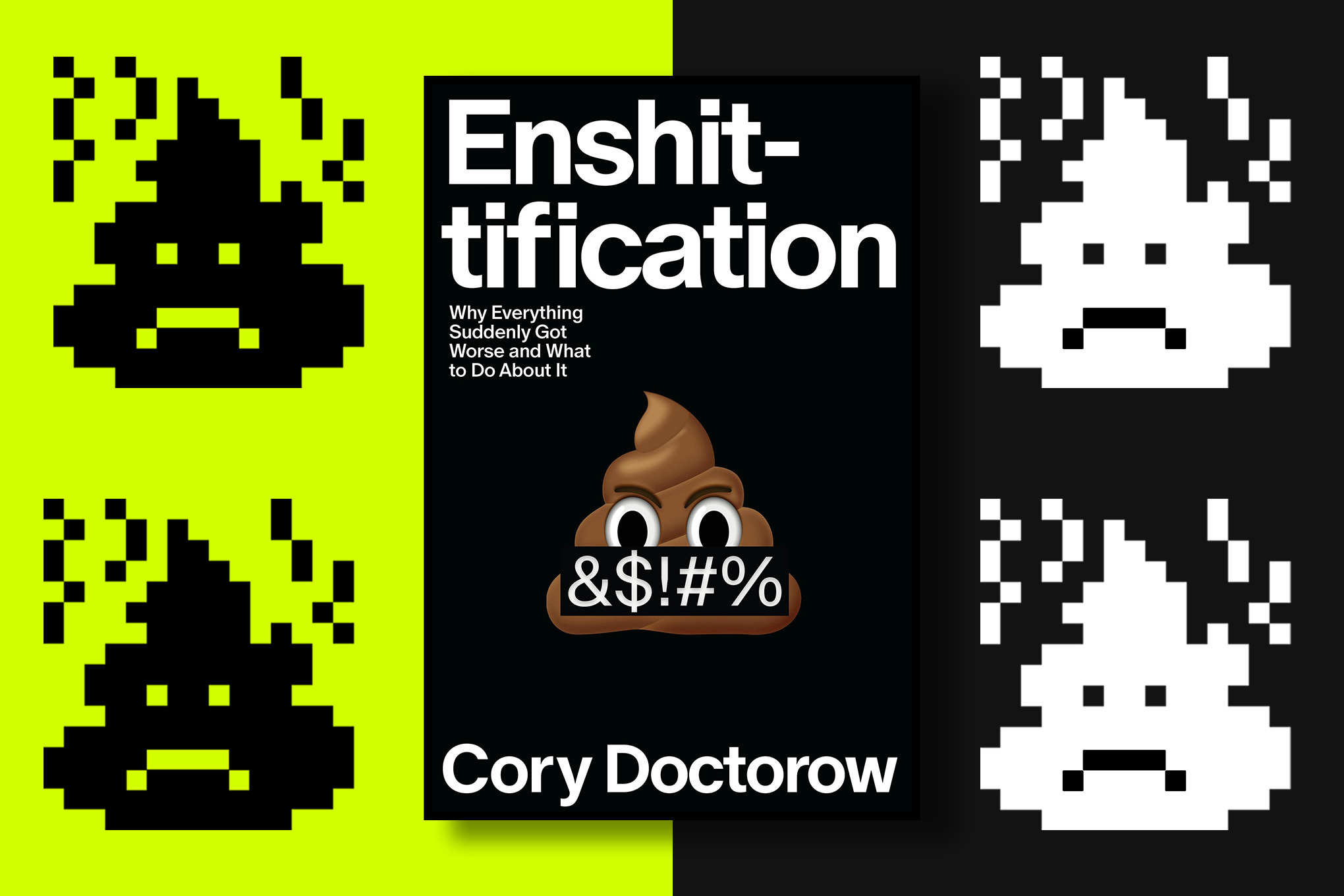The internet’s decline into enshittification mirrors the moral decay of society, revealing a dystopian reality where monopolistic giants exploit users with impunity, much like the corrupt rulers of ancient empires. The time for accountability and reform is now.
Cory Doctorow’s concept of “enshittification” encapsulates a troubling trend in the tech industry, where platforms and products that once promised innovation and user empowerment have devolved into frustrating, subpar experiences. This phenomenon, which Doctorow describes as “platform decay,” reflects a broader narrative about the internet’s transformation from a space of creativity and collaboration into one dominated by corporate interests and monopolistic practices.
The term “enshittification” itself is a stark reminder of how the quality of online experiences has deteriorated over time. Users often find themselves grappling with platforms that prioritize profit over user satisfaction, leading to a frustrating cycle where services become increasingly unusable. This decline is not merely a result of poor design or oversight; it is a systematic issue rooted in the very structure of the tech industry, where a handful of companies wield disproportionate power.
As Doctorow points out, the rise of generative AI has exacerbated this trend, introducing a new layer of complexity to the enshittification narrative. The proliferation of “AI slop”—low-quality, algorithmically generated content—has further diluted the value of online interactions. Users are bombarded with a deluge of mediocre content that clutters their feeds, making it difficult to discern quality information from noise. This shift not only affects individual users but also has broader implications for the creative industries, where original content is increasingly overshadowed by algorithmically driven mediocrity.
The legal and regulatory landscape surrounding these tech giants plays a crucial role in the enshittification process. As companies grow larger and more powerful, they often engage in practices that stifle competition and innovation. Doctorow highlights how laws and regulations have failed to keep pace with the rapid evolution of technology, allowing monopolistic behavior to flourish unchecked. The lack of meaningful consequences for these companies has created an environment where they can prioritize short-term profits over long-term user satisfaction.
This dynamic raises critical questions about the future of the internet and the role of regulation in curbing monopoly power. What laws and frameworks can effectively address the issues of enshittification? How can regulators ensure that the interests of users are protected in an increasingly corporate-dominated landscape? These questions are not merely academic; they are essential for shaping the future of digital spaces that millions rely on daily.
The conversation around enshittification is not just about the decline of individual platforms; it reflects a broader societal concern about the concentration of power in the hands of a few. As tech companies continue to amass wealth and influence, the potential for abuse grows. The narratives surrounding these issues echo historical patterns of power dynamics, where the few exploit the many, leading to societal decay.
In this context, the call for accountability and reform becomes increasingly urgent. Users, creators, and advocates must unite to demand better practices from tech companies and push for regulatory frameworks that prioritize user experience and innovation over corporate greed. The enshittification of the internet is not an inevitable fate; it is a challenge that can be addressed through collective action and a commitment to fostering a healthier digital ecosystem.
As the conversation around enshittification continues to evolve, it is essential to recognize the interconnectedness of technology, law, and society. The choices made today will shape the future of the internet and determine whether it remains a space for creativity and collaboration or devolves further into a realm of corporate exploitation and user frustration. The time for action is now, as the stakes have never been higher for the future of our digital lives.

Hello, and welcome to Decoder. This is Sarah Jeong, features editor at The Verge. I’m standing in for Nilay for one final Thursday episode here as he settles back into full-time hosting duties.
Today, we’ve got a fun one. I’m talking to Cory Doctorow, prolific author, internet activist, and arguably one of the fiercest tech critics writing today. He has a new book out called Enshittifcation: Why Everything Suddenly Got Worse and What to Do About It.
If you want to know what happened to the tech industry, and why the products and platforms you use every day feel like they’ve gotten meaningfully more terrible, this is the book that explains it.
Enshittification as a term is relatively new — Cory only coined it a few years ago to explain a phenomenon you’ll hear him call platform decay, or the experience of a piece of software or a website becoming worse and worse over time. But the term has since become a kind of rallying cry among creatives, tech theorists, and others trying to make sense of where, exactly, the internet went so wrong.
Now, with generative AI, it feels like everything in our digital lives is becoming enshittified in ways that are plainly obvious to even the most casual user of technology. So you’ll also hear Cory and I delve into that intersection between the rise of so-called AI slop and enshittification — and why it’s important that these two themes have so much overlap.
Now, I’ve known Cory for a long time. We’ve traveled in a lot of the same circles on the internet for years, writing and debating copyright, Section 230, and a lot of the other major forces in U.S. law that have shaped the tech industry. And all of that comes up in this conversation, too — because central to the narrative around enshittification is how tech companies became so big and so powerful that they were able to start abusing their market dominance with little to no consequences.
So enshittification, in Cory’s eyes, is as much a legal and regulatory story as it is a product one — but which laws and regulations have what kind of effects over time? What kind of effects will they have in the future? What’s the best way to curb monopoly power?
This was a really fascinating conversation that touches on a lot of Decoder themes that come up again and again on the show. And in true Cory fashion, he really does not hold back. I think you’re going to like it.
If you’d like to read more on what we talked about in this episode, check out the links below:
- Enshittification | Macmillan
- Why every website you used to love is getting worse | Vox
- The age of Enshittification | The New Yorker
- Yes, everything online sucks now — but it doesn’t have to | Ars Technica
- The enshittification of garage-door openers reveals a vast and deadly rot | Cory Doctorow
- Mark Zuckerberg emails outline plan to neutralize competitors | The Verge
- Google gets to keep Chrome, judge rules in search antitrust case | The Verge
- How Amazon wins: by steamrolling rivals and partners | WSJ
- A DRM standard has been approved for the web, and security researchers are worried | The Verge
- Netflix, Microsoft, and Google just quietly changed how the web works | The Outline
Questions or comments about this episode? Hit us up at decoder@theverge.com. We really do read every email!



